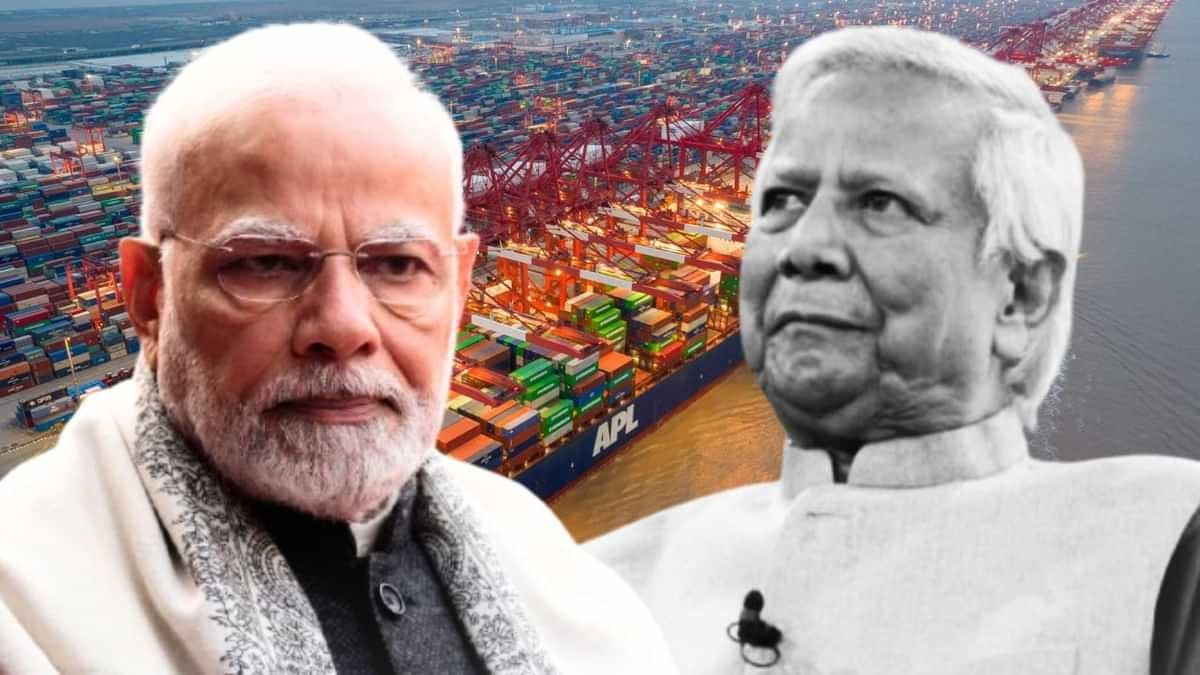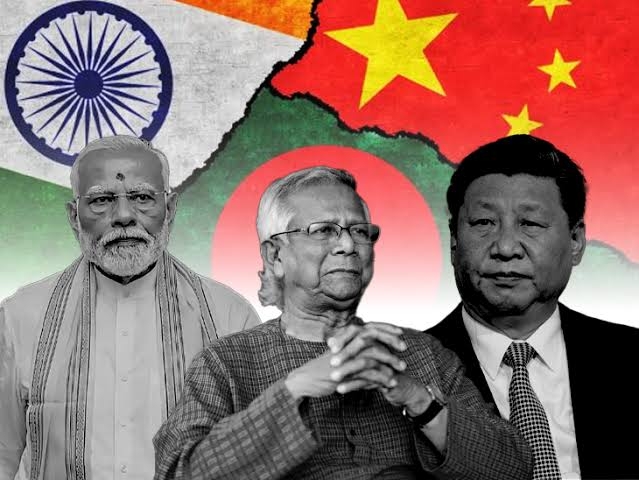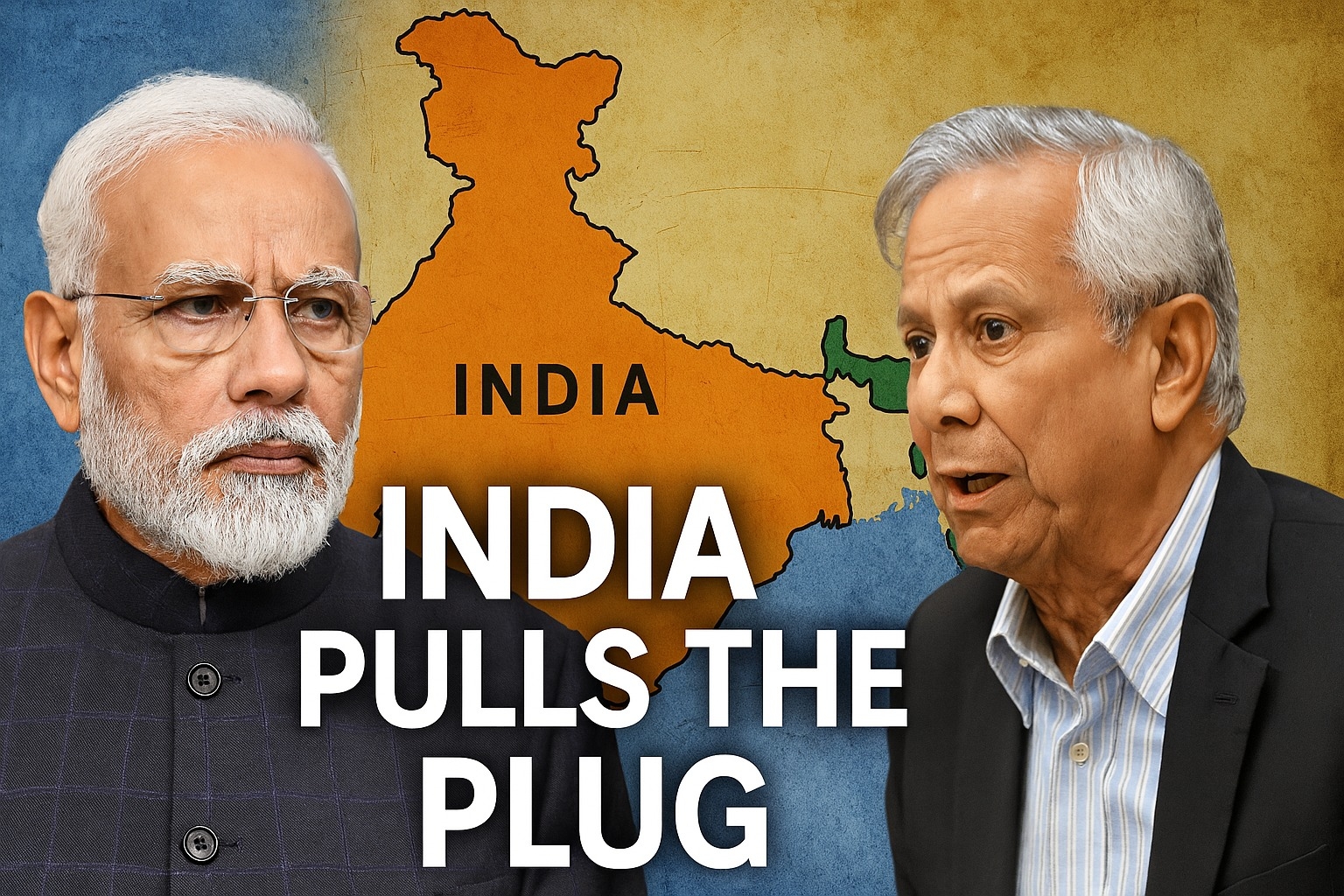India Pulls the Plug

India's recent decision to withdraw the transshipment facility granted to Bangladesh for exporting goods via Indian land routes has sparked heated debate across the subcontinent. While some call it a setback for regional cooperation, a closer analysis reveals a calculated, sovereign decision rooted in national interest, regional strategy, and pragmatic economic planning. This move marks a new chapter in the evolving relationship between Bharat (India) and Bangladesh, particularly in the post-Hasina era.
The Context of the Transshipment Facility
In July 2020, India extended a special transshipment facility to Bangladesh, allowing it to move goods to third countries via Indian land customs stations and ports. This included vital routes through Kolkata, Mumbai, and Chennai, as well as connections to Nepal and Bhutan. Bangladesh, with its burgeoning garment industry, used this route extensively to export readymade garments, food items, and other goods. It was seen as a gesture of goodwill by India, meant to strengthen ties and boost regional trade.
However, goodwill cannot be perpetual when it starts to hurt national interests. India’s customs department recently revoked the facility, citing congestion, export delays, and mounting logistical inefficiencies at Indian ports. The move may appear sudden, but in truth, it reflects growing concerns about reciprocity, security, and shifting geopolitical alignments.
Bangladesh’s Missteps: A Pattern of Diplomatic Arrogance
It is no secret that bilateral relations have soured following the ouster of former Prime Minister Sheikh Hasina. Her government maintained a working relationship with New Delhi, fostering diplomatic balance in the region. However, her successor Muhammad Yunus has taken a more hostile tone.
Yunus’s veiled criticisms of India and overtures towards China have raised eyebrows. His recent comment, indirectly hinting at supporting China's influence in India’s Northeast, has been seen as a red flag by Indian strategic circles. For India, the Northeast is not only a sensitive region due to its unique demographic and geopolitical characteristics but also a frontier of national integrity. Any signal from Dhaka suggesting it could play into Chinese hands cannot be taken lightly.

By aligning more closely with Beijing and showcasing a sense of entitlement in trade arrangements, Bangladesh has misunderstood the current strategic climate. India’s patience has limits, and the withdrawal of the transshipment privilege is a clear signal that Bharat is no longer willing to compromise its logistical sovereignty.
India’s Strategic Calculus: A Shift Toward Assertiveness
Far from being an impulsive decision, India’s revocation of the facility aligns with a broader shift in its foreign policy: balancing regional cooperation with strategic autonomy. Bharat has, in recent years, demonstrated a more assertive posture — be it through the recalibration of relations with China, or its renewed maritime ties with Southeast Asia. With the QUAD gaining traction and India’s Act East Policy progressing, there is less tolerance for neighbors attempting to exploit India’s geographic generosity while cozying up to rival powers.
The Northeast region, once isolated, is now being developed as a hub of international trade and commerce. Infrastructure projects like the India-Myanmar-Thailand Trilateral Highway and Kaladan Multimodal Transit Project aim to reduce dependency on traditional choke points. Bangladesh, by ignoring these developments and failing to match India’s goodwill with strategic cooperation, is losing out.
Economic Impact on Bangladesh: A Self-Inflicted Wound
The withdrawal of this facility is not just a logistical inconvenience for Bangladesh — it is an economic jolt. The country’s readymade garment (RMG) sector, which contributes over 80% of its export revenue, will bear the brunt of increased costs and disrupted supply chains. For a country already grappling with post-pandemic recovery and political instability, this could not have come at a worse time.
Exporters in Bangladesh now face longer routes via sea, costlier transshipment through alternative ports, and an unpredictable customs environment. Many companies that had committed to just-in-time delivery schedules based on Indian routes will have to renegotiate contracts or face penalties.

Moreover, this move may discourage international buyers who valued Bangladesh’s low-cost edge in the garment sector. When logistical reliability takes a hit, cost advantage often follows.
Bangladesh's Strategic Misreading of the Region
Muhammad Yunus’s growing closeness with China, particularly his vocal support for reviving the stalled SAARC (largely blocked by India due to Pakistan’s involvement), showcases a fundamental misreading of regional power dynamics. Unlike Hasina, who managed to balance relations between Beijing and New Delhi, Yunus seems to be betting heavily on a single, increasingly isolated power.

India’s refusal to extradite Hasina, while sensitive, is based on legal and diplomatic grounds. Bangladesh's vocal displeasure on this matter — coupled with anti-India sentiments fanned by state-aligned media — has done little to inspire confidence in the new regime. Instead of engaging constructively, Dhaka appears to be playing the victim card in international forums, a strategy that has rarely worked in the high-stakes world of geopolitics.
A Diplomatic Reset: The Path Forward
India’s message to Bangladesh is clear — goodwill cannot be a one-way street. If Dhaka wants to restore access to India’s infrastructure, it must come back to the negotiating table with a mature outlook. That means toning down anti-India rhetoric, abandoning divisive China-tilt diplomacy, and respecting India’s strategic interests.
From New Delhi’s standpoint, this is not about punishing a neighbor but about protecting national priorities. The door for cooperation remains open — but only if mutual respect forms the basis of that cooperation.
Bharat’s Geopolitical Maturity vs Bangladesh’s Strategic Naivety
India’s decision to withdraw the transshipment facility is a reflection of geopolitical maturity and strategic clarity. Bangladesh, under its new leadership, has unfortunately chosen to test this clarity with poorly calculated moves.
What Dhaka may view as pressure tactics from a bigger neighbor is, in reality, a wake-up call. In a multipolar world, regional cooperation cannot be built on transactionalism and short-term alignments. If Bangladesh continues to play the China card without understanding its long-term repercussions, it risks not only economic hardship but strategic isolation.
Bharat has made its move — diplomatically precise, economically justified, and strategically sound. The next step is Dhaka’s to take. Will it choose cooperation or continue down the path of confrontation?
Only time — and strategy — will tell.